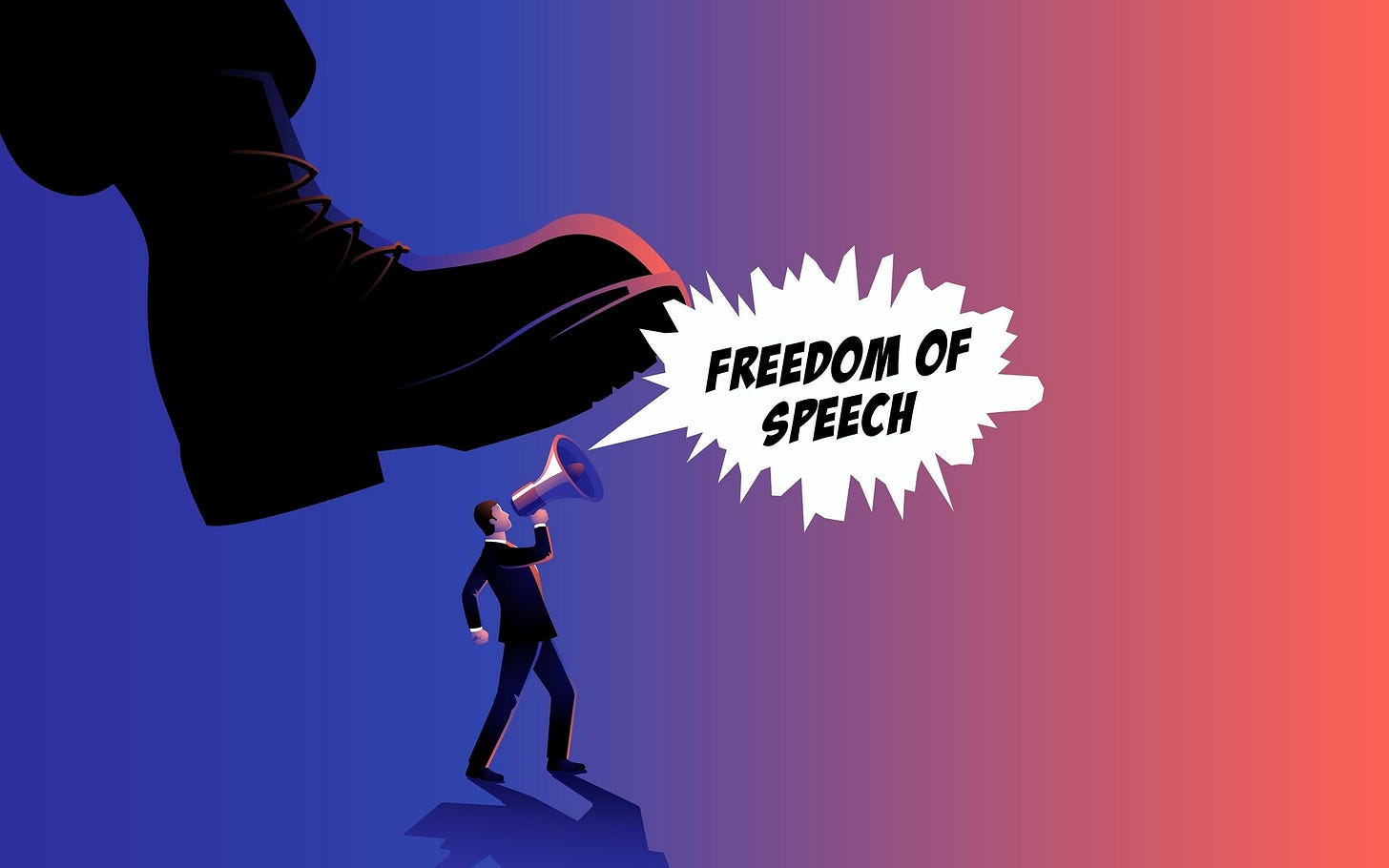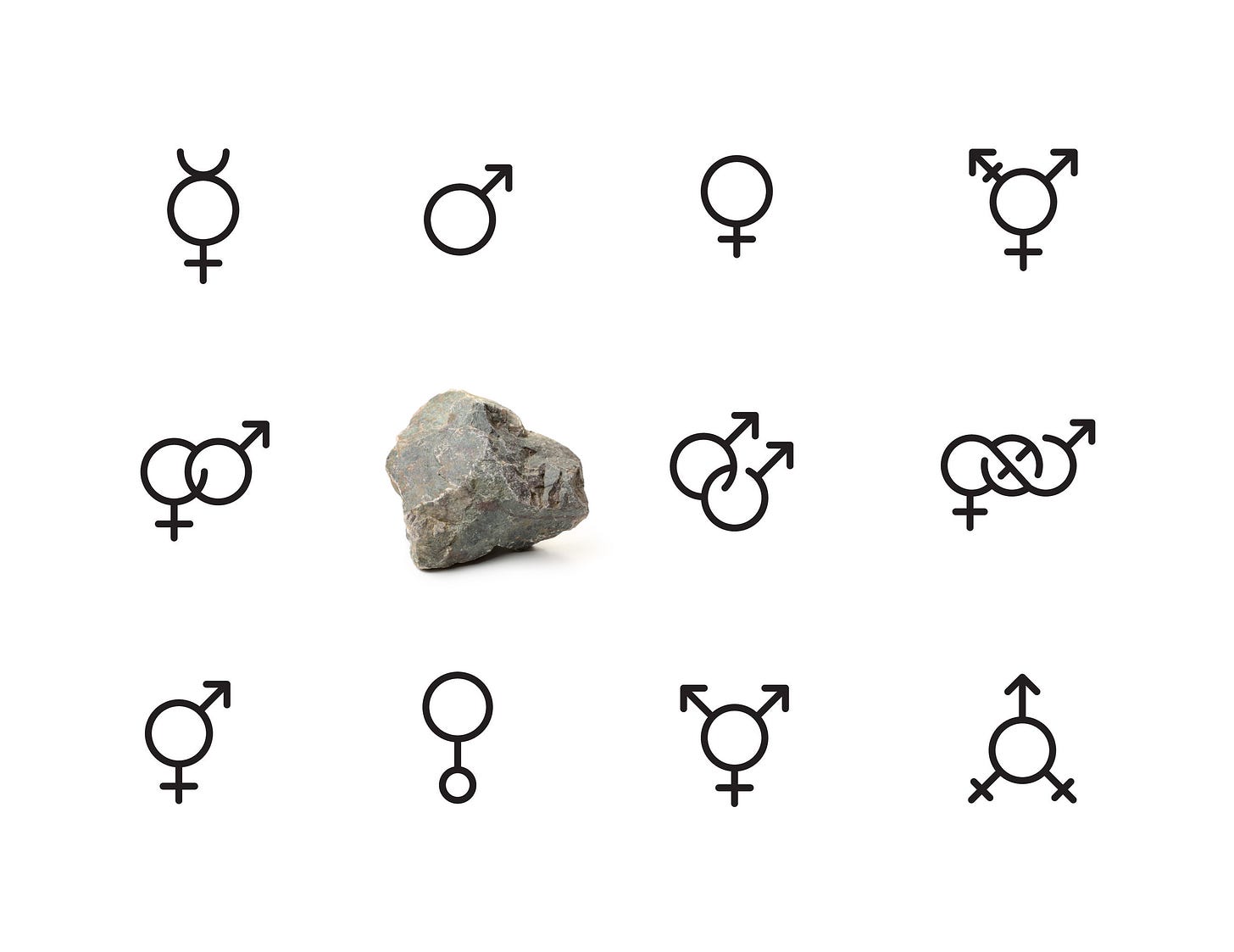E-Pluribus | September 22, 2023
President Joe Biden vs. Free Speech; a new look at an old cancellation; and geology as gender.
A round-up of the latest and best writing and musings on the rise of illiberalism in the public discourse:
Kenin M. Spivak: The Biden Administration’s Escalating Campaign against Free Speech
One person’s free speech is another person’s “misinformation.” But when that second person is president Joe Biden, how much power does he have to suppress opinions he finds objectionable? Not much, as it turns out. Writing for National Review, Kenin Spivak makes the case that the Biden administration has crossed the line by “seeking to stifle the American tradition of robust debate.” It seems the courts are inclined to agree.
There are no exceptions [in the Constitution] for hate speech, false statements, or so-called misinformation (typically, factually correct speech lacking the context preferred by progressives). As Justice Anthony Kennedy explained, the remedy for speech we do not like is to respond to it. Supreme Court decisions have reliably prohibited federal or state action to limit, compel, condition, punish, or exclude political speech, except in the limited circumstances of inciting imminent lawless action, obscenity, defamation, criminal conduct, fighting words, child pornography, and fraud. The bar to clear these thresholds is appropriately high.
The separate right to petition includes all levels of federal and state government. In Borough of Duryea v. Guarnieri (2011), the Supreme Court explained that “speech and petition are integral to the democratic process. . . . The right to petition allows citizens to express their ideas, hopes, and concerns to their government and their elected representatives, whereas the right to speak fosters the public exchange of ideas that is integral to deliberative democracy as well as to the whole realm of ideas and human affairs.”
Filed last year, Missouri v. Biden (see here and here) revealed widespread suppression of free speech. Under pressure from the administration, social-media companies blocked and demonetized views objected to by the administration on topics such as the origins of Covid, vaccine side effects, the Hunter Biden laptop, the economy, climate change, and election integrity, along with expressions of humor and parody. Notably, the government did not contest the relevant evidence in the record for the preliminary injunction, only its significance.
On Independence Day, federal district court judge Terry A. Doughty issued a preliminary injunction blocking the White House and numerous federal agencies from communicating with social-media companies for “the purpose of urging, encouraging, pressuring, or inducing in any manner the removal, deletion, suppression, or reduction of content containing protected free speech.”
In an appeal to the Fifth Circuit Court of Appeals, the government doubled down, speciously arguing that because it has a right to promote its views, it must also have the right to suppress dissent, provided only that it does not pair its demands with a “specific” threat of sanctions for noncompliance. The government denied that its threats amounted to coercion, despite clear evidence that the administration repeatedly threatened recalcitrant platforms that it would enforce antitrust law, rescind Section 230 of the Communications Decency Act (which insulates internet companies from liability for third-party content), and withdraw its cooperation. Further, President Biden publicly accused social-media companies that were inadequately suppressing dissenting views of “killing people,” and administration officials directed invective-laced demands and criticisms in emails sent to social-media companies that did not promptly fall into line.
[. . .]
[S]ince taking office, the Biden administration has engaged in an aggressive rhetorical overhaul that it admits is intended to change the message. Among numerous examples, the administration directed the Department of Homeland Security to stop using the terms “alien” and “illegal alien,” and the CDC issued “inclusive communication principles” for uses in areas ranging from public health to television scripts. Among its recommendations are to cease using “inmate,” “handicapped,” “alcoholic,” “uninsured,” “homeless,” “poor,” “male,” “female,” “stakeholder,” and “insane.” For many organizations and institutions, CDC recommendations carry the weight of legal mandates.
With the full power of the federal government, the Biden administration is seeking to stifle the American tradition of robust debate. As litigation and House investigations demonstrate, it has had far more success than most Americans realize. This country was founded by those who understood the importance of individual freedom and the rights to criticize and petition government. They fought a revolution to pursue those ideals. It is incumbent on Americans today to defend and preserve that legacy.
Read the whole thing.
James Huffman: The Cancellation of Bertrand Russell
From the outset, Pluribus has defined “cancellation” as “characterized by disproportionate, punitive, coordinated, personal destruction and discrediting for a real or perceived offense with no offer of redemption.” At Quillette, James Huffman recalls the attempted cancellation of philosopher Bertrand Russell eight decades ago, which was fueled by claims that he was a “propagandist against religion and morality…” Huffman says Russell’s case bears striking resemblance to current debates over academic freedom and “should be a cautionary tale” to us all these years later.
In February 1940, Russell was appointed Professor of Philosophy at the College of the City of New York by unanimous vote of the Board of Higher Education of New York City. (He was assigned to teach three courses with unwieldy names: logic and its relation to science, mathematics, and philosophy; problems in the foundations of mathematics; and relations of the pure to applied sciences and the reciprocal influence of metaphysics and scientific theories.) But within scarcely a month, Justice John E. McGeehan of the New York Supreme Court (in New York State, this is the designation of the trial court) ordered the Board to revoke Russell’s appointment, ruling that the appointment “adversely affects public health, safety, and morals” and would “aid, abet, or encourage … conduct tending to a violation of penal law.” A year later, in 1941, philosopher and educational reformer John Dewey noted that, although the Russell case was closed, “the issue underlying it is no more settled than the Dred Scott case [which ruled that no African American could ever become a US citizen] settled the slavery issue.” Eight decades later, the issues raised by the Russell case—the rights to free speech and academic freedom—have still not been settled.
[. . .]
Russell’s case had become a casus belli for many in the academy. Most of his academic colleagues took his side. Unlike today, colleges and universities of Russell’s era embraced professors of widely divergent views. They did not have any administrative departments devoted to policing expression in order to prevent people from voicing unorthodox ideas or causing student discomfort. Many leading mathematicians—including Albert Einstein, Oswald Veblen, Harlow Shapley, and Edward Kasner—came to Russell’s defense, as did the nation’s leading philosophers, such as Ashley Montagu, Curt John Decasse, Sidney Hook, Ralph Perry, John Randall, Morris Cohen, and Arthur Lovejoy. None of them agreed with Russell on all points of philosophy, but they all spoke up for freedom of expression in the pursuit of truth.
Presidents of leading institutions of higher education including Robert Hutchins of the University of Chicago, William Neilson of Smith College, Harry Gideonse of Brooklyn College, Frank Graham of the University of North Carolina, and Mildred McAfee of Wellesley College expressed their dismay at McGeehan’s decision and at the failure of the New York courts to defend academic freedom. In a letter to the New York Times, Harry Chase, Chancellor of New York University, wrote that “a blow has been struck at the security and intellectual independence of every faculty member in every public college and university in the United States.” Similar concerns were expressed by presidents and past presidents of Phi Beta Kappa, the American Mathematical Association, the American Sociological Association, the American Historical Association, the American Philosophical Association, the American Psychological Association, and the American Association of University Professors.
Russell also drew support from outside the academy. New York Herald Tribune columnist Dorothy Thompson called Russell “a twentieth-century Socrates” and described the affair as “the attempt to destroy the professional life of a distinguished scholar because he voices opinions which are, in fact, the actual practices of a part of our most respected population.” Thompson knew of what she wrote. In 1934, she was expelled from Germany on the direct orders of Adolph Hitler. In 1940, while the Russell case was underway, she was forced to leave the Herald Tribune for the New York Post because Tribune publisher Ogden Reid objected to the fact that she had supported Franklin D. Roosevelt in the recent presidential election.
But Russell’s supporters were no match for his antagonists. The Baptist clergyman I. R. Wall brought a suit demanding Russell’s dismissal from his ongoing teaching duties at the University of California at Los Angeles. Thomas Dorgan, a Democratic politician in Massachusetts, demanded that Harvard University rescind its appointment of Russell as the 1940 William James Lecturer in Philosophy. The California lawsuit was dismissed, and Harvard’s president and fellows found it “in the best interests of the University” to reaffirm Russell’s appointment—but they failed to use the occasion to voice a full-throated defense of Russell’s academic freedom. Among Harvard’s supporters and alumni there were, no doubt, many who disapproved of Russell’s work.
Read it all.
Max Eden: My Gender Is “Rock”
“I Am a Rock,” Paul Simon sang. Everyone knew he was using that phrase as a metaphor, but things are different today. At City Journal, Max Eden writes that for some advocates of so-called “neopronouns and neo-identities,” Simon’s metaphor could actually be an expression of one’s gender.
Unless you’ve been living under a rock, you know that gender ideologues believe that a man can identify as a woman. But did you know that you can identify as a rock?
This is the position of Gender Spectrum, arguably the most influential gender identity nonprofit in K-12 education. Gender Spectrum’s website says that it has “trained thousands of schools and school districts . . . building the capacities of tens of thousands of teachers, administrators . . . and other leaders to create gender inclusive environments.”
[. . .]
Auditors from Open the Books examined a 2022 Gender Spectrum video training titled “Intro to Neoidentities and Neopronouns.” Naomi Cruz, then Gender Spectrum’s manager of family and educational programming, explained that it’s wrong to assume that gender identity should be confined to variants of male and female. Neopronouns and neo-identities help to break down the gender binary and move “away from a societal gender to a personal gender.” It is “impossible,” she explains, to know all potential gender identities or pronouns. But it’s “really important” to have an “intersectional understanding” of gender because race, religion, location, and even hobbies can affect people’s understanding of gender. (Though some gender theorists claim that gender identity is fixed and immutable, possibly requiring sterilizing hormones and castration, Gender Spectrum’s stance is that gender kinda depends on your hobbies.)
[. . .]
Then there are noungenders—for example, rockgender, moongender, and foxgender. If a man identifies as a woman, then, according to gender ideologues, he truly is a woman. However, if a man identifies as the moon, he is not necessarily the moon. It might just mean that he identifies with society’s perception of the moon. Get it?
It is, however, important to note that you’re not permitted to assume a gender identity associated with another race, Cruz explains. A white person cannot identify as a black-related gender. A white person can, however, identify as a rock. And a black person could, of course, identify as a penguin.
You probably wouldn’t think that autism and borderline personality disorder are gender identities. But you would be wrong, says Cruz. There is autismgender and bordergender. There is also gendervague. Cruz couldn’t quite explain what this one meant, but you can only identify as gendervague if you are neurodiverse.
Anticipating objections, Cruz said that “of course” neogenders are “valid,” and “They are not taking it too far. They are a radical act of stepping away from a system that’s causing a lot of harm for folks.” Using neo-identities is “a way of undoing the gender binary and gender norms, which liberates everyone.”
This all might sound fringe, but Gender Spectrum is no fringe gender-identity organization. Few, if any, nonprofits have done more to influence how public education addresses gender identity and gender-identity issues. And Gender Spectrum believes that rockgender and autismgender are both valid gender-identity categories.
Read it all here.
Around Twitter
The Foundation Against Intolerance & Racism (FAIR) is preparing to issue an open letter advocating for “greater fairness for authors and artists who submit their work to literary journals.”
Nicholas Grossman isn’t buying Senator Bob Menendez’ identity politics defense against allegations of corruption:
And finally, Christopher Rufo’s advice for Ibram X. Kendi might have come too late:









